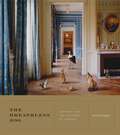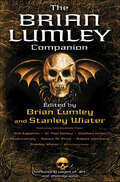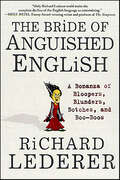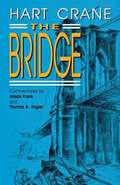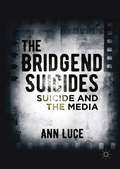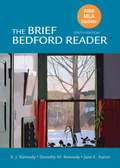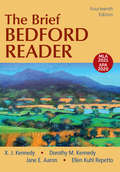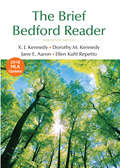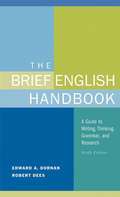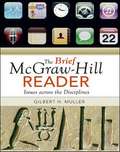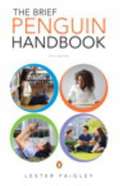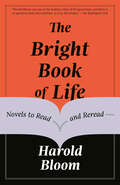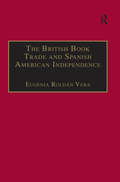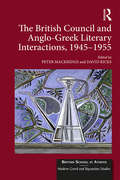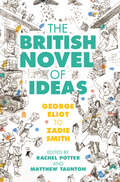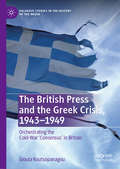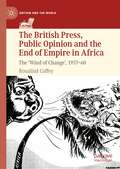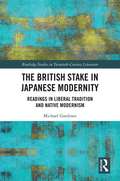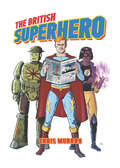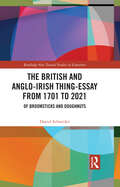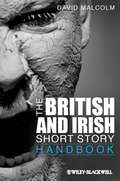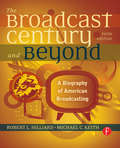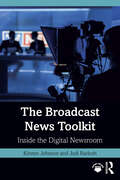- Table View
- List View
The Breathless Zoo: Taxidermy and the Cultures of Longing (Animalibus)
by Rachel PoliquinFrom sixteenth-century cabinets of wonders to contemporary animal art, The Breathless Zoo: Taxidermy and the Cultures of Longing examines the cultural and poetic history of preserving animals in lively postures. But why would anyone want to preserve an animal, and what is this animal-thing now? Rachel Poliquin suggests that taxidermy is entwined with the enduring human longing to find meaning with and within the natural world. Her study draws out the longings at the heart of taxidermy—the longing for wonder, beauty, spectacle, order, narrative, allegory, and remembrance. In so doing, The Breathless Zoo explores the animal spectacles desired by particular communities, human assumptions of superiority, the yearnings for hidden truths within animal form, and the loneliness and longing that haunt our strange human existence, being both within and apart from nature.
The Breathless Zoo: Taxidermy and the Cultures of Longing (Animalibus: Of Animals and Cultures #1)
by Rachel PoliquinFrom sixteenth-century cabinets of wonders to contemporary animal art, The Breathless Zoo: Taxidermy and the Cultures of Longing examines the cultural and poetic history of preserving animals in lively postures. But why would anyone want to preserve an animal, and what is this animal-thing now? Rachel Poliquin suggests that taxidermy is entwined with the enduring human longing to find meaning with and within the natural world. Her study draws out the longings at the heart of taxidermy—the longing for wonder, beauty, spectacle, order, narrative, allegory, and remembrance. In so doing, The Breathless Zoo explores the animal spectacles desired by particular communities, human assumptions of superiority, the yearnings for hidden truths within animal form, and the loneliness and longing that haunt our strange human existence, being both within and apart from nature.
The Brian Lumley Companion
by Stanley WiaterEdited by Brian Lumley and multiple Bram Stoker Award winner Stanley Wiater, The Brian Lumley Companion is an indispensable guide to the life and works of Brian Lumley. The Companion is illustrated with photographs from the author's private collection and full-color reproductions of Hugo Award–winning artist Bob Eggleton's eye-catching cover art for Lumley's works. Contributors to The Brian Lumley Companion include some of today's most noted experts on horror fiction, including W. Paul Ganley, founder of Weirdbook Press and two-time winner of the World Fantasy Award; Stephen Jones, coeditor of Horror: 100 Best Books and winner of multiple World Fantasy, British Fantasy, and Bram Stoker Awards; Robert M. Price, author of H. P. Lovecraft and the Cthulhu Mythos and one of the most respected analysts of Lovecraftian fiction; Robert G. Weinberg, an acknowledged specialist in weird fiction, and Stanley Wiater, host of the TV series "Dark Dreamers." In The Brian Lumley Companion, Lumley aficionados will find an overview of Lumley's career, from his first short fiction up to the present day; essays comparing Lumley and H. P. Lovecraft, a lengthy interview with the author that delves into the heart of Lumley's relationship with the writers and editors who inspired him and the fans who support him, and analyses of Lumley's short fiction and novels. An interview with Bob Eggleton gives insight into the development of his striking covers for the Necroscope series and other Lumley works. This companion also includes complete listings of the first publications of each of Lumley's novels, short fiction, and poetry. Major attractions are the detailed concordances that focus on individual novels and series, including the three Psychomech titles, the Dreamlands and Primal Lands series, and each volume in the Necroscope series. As a special treat, The Brian Lumley Companion includes three short short stories by Brian Lumley, works that have never before appeared in book form.
The Bride of Anguished English: A Bonanza of Bloopers, Blunders, Botches, and Boo-Boos
by Richard LedererFor years wordsmith and punster Richard Lederer has charmed and delighted fans with his bestselling "Anguished English" series. In his funniest book yet, readers will again cherish the author's latest chronicle of the goofs and gaffes and fluffs and flubs of our anguished language. And the best part? Everything in here actually occurred! Nothing has been made up!Bloopers from foreign restaurants include: * "Our wines leave you nothing to hope for."* "As for the tripe served here, you will be singing its praises to your grandchildren on your deathbed."Excerpts from students' twisted history papers include:* "World War I made the people so sad that it brought on the Great Depression."* "America was founded by four fathers. Delegates from the original 13 states formed the Contented Congress. Thomas Jefferson, a Virgin, and Benjamin Franklin were two singers of the Decoration of Independence, which says that all men are cremated equal and are well endowed by their creator."Hilarious illustrations by Jim McLean make The Bride of Anguished English the perfect book for anyone who loves English with all its blunders and bloopers and quips and quirks.
The Bridge
by Hart CraneBegun in 1923 and published 1930, The Bridge is Crane's major work. "Very roughly," he wrote a friend, "it concerns a mystical synthesis of 'America' ... The initial impulses of 'our people' will have to be gathered up toward the climax of the bridge, symbol of our constructive future, our unique identity."
The Bridgend Suicides
by Ann LuceThis in depth analysis looks at how suicide was represented in the British press when 20 young people between the ages of 15 and 29 took their own lives in the South Wales Borough of Bridgend in 2008. The chapters highlight specific categories of description that journalists use to explain suicide to their readers. The study also examines the discourses that emerged around suicide that continue to perpetuate stigma and shame when suicide occurs today. Using her own experience of having lost a loved one to suicide, coupled with original research, the author gives a very frank explanation of why suicide is not accepted in society today.
The Brief Bedford Reader (Tenth Edition)
by X. J. Kennedy Dorothy M. Kennedy Jane E. AaronA compact version of one of the most widely adopted composition readers of all time "The Brief Bedford Reader" continues to engage and inspire with 50 remarkable selections, all the outstanding instructional material of the full-length text, and a unique "Writers on Writing" feature in which 32 of the book's writers comment on their process and their work. Thorough coverage of critical reading, effective writing, and working with sources guides students, now more than ever, through their own academic writing. And an exciting visual dimension shows that rhetorical methods apply to both images and text. "The Brief Bedford Reader" is a favorite of students for the Kennedys' clarity and wit, of instructors for the flexible and realistic view of the rhetorical methods, and of both for the superior selections and perceptive commentaries by writers worth reading.
The Brief Bedford Reader with 2020 APA and 2021 MLA Updates
by Dorothy M. Kennedy Jane E. Aaron Ellen Kuhl Repetto X. J. KennedyThis ebook has been updated to provide you with the latest guidance on documenting sources in MLA style and follows the guidelines set forth in the MLA Handbook, 9th edition (April 2021).The first Bedford title ever published, The Brief Bedford Reader continues to make its mark. One of the most popular composition readers on the market, it combines timeless readings with the leading voices of our time. It takes a practical and flexible approach to the rhetorical methods, focusing on their uses in varied writing situations. The unique “Writers on Writing” feature connects reflections from professional writers with point-of-need advice for student writers, and the Kennedys' proven approach to instruction helps students connect critical reading to academic writing. The fourteenth edition has been thoroughly revised with engaging new readings by remarkable and diverse writers, a stronger foundation in reading and writing, and new graphic organizers to visually outline how to use each method.
The Brief Bedford Reader, 13th Edition
by X. J. Kennedy Dorothy M. Kennedy Jane E. Aaron Ellen Kuhl RepettoLong one of the most popular composition readers on the market, The Brief Bedford Reader combines timeless readings with the leading voices of our day. It takes a practical and flexible approach to the rhetorical methods, focusing on their uses in varied writing situations. The unique and newly reimagined "Writers on Writing" feature connects reflections from professional writers with point-of-need advice for student writers, and the Kennedys' class-proven instruction helps students connect critical reading to academic writing. The thirteenth edition has been thoroughly revised with compelling readings, helpful guidance for students on critical reading and writing, and an appendix covering APA documentation and 2016 MLA documentation MLA and APA documentation.
The Brief English Handbook: A Guide to Writing, Thinking Grammar, and Research,Ninth Edition
by Edward A. Dornan Robert DeesThe Brief English Handbook offers the convenience and coverage of other handbooks at half the cost. Despite its streamlined size, The Brief English Handbook gives thorough attention to critical thinking, research, and the writing process in addition to chapters on argument, essay exams, and writing about literature. This resource even extends beyond college with significant coverage of resumes and workplace writing.
The Brief McGraw-Hill Reader: Issues across the Disciplines
by Gilbert H. MullerSupporting a liberal arts tradition in the classroom, across the curriculum, and beyond, The Brief McGraw-Hill Reader offers rich and diverse readings in education, the social sciences, business and economics, the humanities, and the sciences.
The Brief Penguin Handbook Fifth Edition
by Lester FaigleyNow updated with expanded research, academic writing, and documentation coverage, The Brief Penguin Handbook continues to revolutionize the way handbooks present information. The design and approach of The Brief Penguin Handbook started with ideas and suggestions from real students, and thus is uniquely successful when it comes to giving students the information they need in a format they will actually use. Because of its unique navigation tools, visual guides, and models for writing, research, and documentation, distinctive coverage of writing for different purposes, and Lester Faigley's clear, accessible explanations,The Brief Penguin Handbook is a best-selling handbook.
The Bright Book of Life: Novels to Read and Reread
by Harold BloomIn his first book devoted exclusively to narrative fiction, America's most original and controversial literary critic and legendary Yale professor writes trenchantly about fifty-two masterworks spanning the Western tradition.Perhaps no other literary critic but Harold Bloom could--or would--undertake a project of this immensity. And certainly no other critic could bring to it the extraordinary knowledge, understanding, and insight that are the hallmark of Bloom's every book. Ranging across centuries and continents, this final book of his career, gives us the inimitable critic on Don Quixote and Book of Numbers; Wuthering Heights and Absalom, Absalom; Les Miserables and Blood Meridian; Vanity Fair and Invisible Man; The Captain's Daughter and The Reef. He writes about works by Austen, Balzac, Dickens, Tolstoy, James, Conrad, Lawrence, Wolff, Le Guin, Sebald, and many more. Whether you have already read these books, or intend to, or simply care about the importance and power of fiction, Harold Bloom serves as an unparalleled guide through the pages of these 52 masterpieces of the genre.
The British Book Trade and Spanish American Independence: Education and Knowledge Transmission in Transcontinental Perspective
by Eugenia Roldán VeraThe British Book Trade and Spanish American Independence is a pioneering study of the export of books from Britain to early-independent Spanish America, which considers all phases of production, distribution, reading, and re-writing of British books in the region, and explores the role that these works played in the formation of national identities in the new countries. Analysing in particular the publishing house of Rudolph Ackermann, which dominated the export of British books in Spanish to the former colonies in the 1820s, it discusses the ways in which the printed form of these publications affected the knowledge conveyed by them. After a survey of the peculiar characteristics of print culture in early-independent Spanish America and the trends in the import of European books in the region, the author examines the operation of Ackermann's publishing enterprise. She shows how the collaborative nature of this enterprise, involving a number of Spanish American diplomats as sponsors and Spanish exiles as writers and translators, shaped the characteristics of its publications, and how the notion of 'useful knowledge' conveyed by them was deployed in the service of both commercial and educational concerns. The hitherto unexplored mechanisms of book import, distribution, wholesale and retailing in Spanish America in the 1820s are also analysed as is the way in which the significance of the knowledge transmitted by those books shifted in the course of their production and distribution. The author examines how the question-and-answer form of Ackermann's textbooks constrained both publishers and writers and oriented their readers' relation with the texts. She then looks at the various ways in which foreign knowledge was appropriated in the construction of individual, social, national, and continental identities; this is done through the study of a number of individual reading experiences and through the analysis of the editions and adaptations of Ackermann's textbooks during the nineteenth century.
The British Council and Anglo-Greek Literary Interactions, 1945-1955 (British School at Athens - Modern Greek and Byzantine Studies #6)
by Peter Mackridge David RicksIn the immediate aftermath of the Second World War, and with British political influence over Greece soon to be ceded to the United States, there was a considerable degree of cultural interaction between Greek and British literati. Sponsored or assisted by the British Council, this interaction was notable for its diversity and quality alike. Indeed, the British Council in Greece made a more significant contribution to local culture in that period than at any other time, and perhaps in any other country. Many of the participants – among them Patrick Leigh Fermor, Steven Runciman, and Louis MacNeice – are well known, while others deserve to be better known than they are today. But what has been less fully discussed, and what the volume sets out to do, is to explore the two-way relations between Greek and British literary production in which the British Council played a particularly important role until the outbreak of armed conflict in Cyprus in 1955, which rendered further contacts of this kind difficult. Close attention is paid to the variety of ways – marked by personal affinities and allegiances, but also by political tensions – in which the British Council functioned as an agent of interaction in a climate where a complex blend of traditional Anglophilia or Philhellenism found itself encountering a new post-war and Cold War environment. What is distinctive about the volume, beyond the inclusion of much recent archival research, is its attention to the British Council as part of the story of Greek letters, and not just as a place in which various British men and women of letters worked. The British Council found itself, sometimes more through improvisation and personal affinities than through careful planning, at the heart of some key developments, notably in terms of important periodical publications which had a lasting influence on Greek letters. Though in the cultural forum that influence was arguably to be less pervasive than that of France, with its more ambitious cultural outreach, or than that of the USA in later decades, the role of the British Council in Greece in this crucial period of Greek (and indeed European) post-war history continues to make a rich case study in cultural politics. This volume thus fills a gap in the rich bibliography on Anglo-Greek relations and contributes to a wider scholarly and public discussion about cultural politics.
The British Novel of Ideas: George Eliot to Zadie Smith
by Rachel Potter Matthew TauntonThe novel of ideas is an important form that is both under-theorised and largely neglected in accounts of the development of the novel in the twentieth and twenty-first centuries. This book sets out the history of this critical hostility, which took hold as the aesthetic protocols of literary modernism became established among key literary tastemakers in Britain. It then proposes a revaluation and a critical reclamation of the novel of ideas, showcasing a range of perceptive, sympathetic, and sensitive ways of reading novels in which discursive argumentation is foregrounded and where the clash of ideas is vital to the novelistic effect. Through thematic chapters as well as new accounts of key novelists in the British tradition-including George Eliot, H. G. Wells, Doris Lessing and Kamila Shamsie-this book repositions the novel of ideas as a major form in modern British literature.
The British Press and the Greek Crisis, 1943–1949: Orchestrating the Cold-War ‘Consensus’ in Britain (Palgrave Studies in the History of the Media)
by Gioula KoutsopanagouThis book provides the first detailed analysis of how interactions between government policy and Fleet Street affected the political coverage of the Greek civil war, one of the first major confrontations of the Cold War. During this period the exponential growth of media influence was an immensely potent weapon of psychological warfare. Throughout the 1940s the press maintained its position as the most powerful medium and its influence remained unchallenged. The documentary record shows that a British media consensus was more fabricated than spontaneous, and the tools of media persuasion and manipulation were extremely important in building acceptance for British foreign policy. Gioula Koutsopanagou examines how this media consensus was influenced and molded by the British government and how Foreign Office channels were key to molding public attitudes to British foreign policy. These channels included system of briefings given by the News Department to the diplomatic correspondents, and the contacts between embassies and the British foreign correspondents.
The British Press, Public Opinion and the End of Empire in Africa: The 'Wind of Change', 1957-60 (Britain and the World)
by Rosalind CoffeyThis book provides fresh insights into how the British press affected both British perceptions of decolonisation in Africa and British policy towards it during the ‘wind of change’ period. It also reveals, for the first time, the extent to which British newspaper coverage was of relevance to African and white settler readerships. British newspapers informed the political strategies and civic cultures of African activists,nationalists, liberal whites in Africa, the staunchest of white settler communities, and the first governments of independent African states and their opponents. The British press, British public opinion and British journalists became etched into the lived experiences of the end of empire affecting Anglo-African and Anglo-settler relations to this day. Arguing that the press cast a transnational web of influence over the decolonisation process in Africa, the author explores the relationships between the British, African and settler public and political spheres, and highlights the mediating power of the British press during the late 1950s. The book draws from a range of British newspapers, official government documents, newspaper archives, interviews, memoirs, autobiographies and articles printed in African and white settler papers. It will be of interest to historians of decolonisation, Africa, the media and the British Empire.
The British Stake In Japanese Modernity: Readings in Liberal Tradition and Native Modernism (Routledge Studies in Twentieth-Century Literature)
by Michael GardinerThis book describes firstly a Japanese modernity which is readable not only as a modernising, but also as a Britishing, and secondly modernist attempts to overhaul this British universalism in some well-known and some less-known Japanese texts. From the mid-nineteenth century, and particularly as hastened by the spectre of China in the First Opium War, Japan’s modernity was bound up with a convergence with British Newtonian cosmology, something underscored by the British presence in Meiji Japan and the British education of key Meiji state-makers. Moreover the thinking behind Britain’s own unification in the long eighteenth century, particularly the Scottish Enlightenment, is echoed strikingly faithfully in the 1860s-70s work of Fukuzawa Yukichi, Nakamura Masanao, and other writers in the ‘Japanese Enlightenment’. However, from around the end of the Meiji era, we can see a concerted and pointed response to this British universalism, its historiography, its basis in the sovereign individual subject, and its spatial mapping of the world. Elements of this response can be read in texts including Natsume Sōseki’s Kokoro, Watsuji Tetsurō’s Fūdo (Climate and Culture), Tanizaki Jun’ichirō’s In’ei Raisan (In Praise of Shadows), Kawabata Yasunari’s Yukiguni (Snow Country), and various work of the mid-period Kyoto School. Rarely understood in terms of its British specificity, this response should have something to say to modernist studies more generally, since it aimed at a pluralism and de-universalisation that was difficult for mainstream British modernism itself. Indeed the strength of this de-universalisation may be precisely why these ‘native’ Japanese modernist tendencies have not much been accepted as modernism within the Anglophone academy, despite this field’s apparent widening of its ground in the twenty-first century.
The British Superhero
by Chris MurrayChris Murray reveals the largely unknown and rather surprising history of the British superhero. It is often thought that Britain did not have its own superheroes, yet Murray demonstrates that there were a great many in Britain and that they were often used as a way to comment on the relationship between Britain and America. Sometimes they emulated the style of American comics, but they also frequently became sites of resistance to perceived American political and cultural hegemony, drawing upon satire and parody as a means of critique. Murray illustrates that the superhero genre is a blend of several influences, and that in British comics these influences were quite different from those in America, resulting in some contrasting approaches to the figure of the superhero. He identifies the origins of the superhero and supervillain in nineteenth-century popular culture such as the penny dreadfuls and boys' weeklies and in science fiction writing of the 1920s and 1930s. He traces the emergence of British superheroes in the 1940s, the advent of "fake" American comics, and the reformatting of reprinted material. Murray then chronicles the British Invasion of the 1980s and the pivotal roles in American superhero comics and film production held by British artists today. This book will challenge views about British superheroes and the comics creators who fashioned them. Murray brings to light a gallery of such comics heroes as the Amazing Mr X, Powerman, Streamline, Captain Zenith, Electroman, Mr Apollo, Masterman, Captain Universe, Marvelman, Kelly's Eye, Steel Claw, the Purple Hood, Captain Britain, Supercats, Bananaman, Paradax, Jack Staff, and SuperBob. He reminds us of the significance of many such creators and artists as Len Fullerton, Jock McCail, Jack Glass, Denis Gifford, Bob Monkhouse, Dennis M. Reader, Mick Anglo, Brendan McCarthy, Alan Moore, Grant Morrison, Dave Gibbons, and Mark Millar.
The British and Anglo-Irish Thing-Essay from 1701 to 2021: Of Broomsticks and Doughnuts (Routledge New Textual Studies in Literature)
by Daniel SchneiderWhile the it-narrative, the thing-poem and thing theatre have been around for some time, the essay – which is often considered literature’s fourth genre – is still lacking its thing-subgenre. Yet, particularly British and Anglo-Irish literature display a long, albeit so far implicit tradition of texts that can be categorised as ‘thing-essays’: Starting with Jonathan Swift’s “Meditation upon a Broomstick” (1701) and continuing until today, these texts draw broader insights from the contemplation of a material item of daily life. This book provides the first theoretical conceptualisation of this genre. Bringing elements from essay studies and the New Materialisms together, it shows why the essay lends itself particularly well to literarisations of the personal relationships that people foster to everyday objects. While the idiosyncrasies of each essay show the versatility of thing-essays, the study also seeks to unearth changing attitudes towards things – and thus towards people’s material surroundings in general – throughout time. In order to account for such synchronic and diachronic differences in thing-essays, this study develops a typology of three modes via which things can be approached essayistically. In the book’s second part, this framework will be employed in close readings and historicisations of 14 thing-essays from 1701 until 2021. Ranging from satire to sentimental writing, from religion to consumerism, from class to gender differences, from feelings of nationality to exoticism, from the French Revolution to Freud and from art to everyday life, the stylistic and thematic broadness of these thing-essays ultimately shows the multifarious connections between human life and materiality.
The British and Irish Short Story Handbook (Wiley Blackwell Literature Handbooks #33)
by David MalcolmThe British and Irish Short Story Handbook guides readers through the development of the short story and the unique critical issues involved in discussions of short fiction. It includes a wide-ranging analysis of non-canonical and non-realist writers as well as the major authors and their works, providing a comprehensive and much-needed appraisal of this area. Guides readers through the development of the short story and critical issues involved in discussions of short fiction Offers a detailed discussion of the range of genres in the British and Irish short story Includes extensive analysis of non-canonical writers, such as Hubert Crackanthorpe, Ella D’Arcy, T.F. Powys, A.E. Coppard, Julian Maclaren-Ross, Mollie Panter-Downes, Denton Welch, and Sylvia Townsend Warner Provide a wide-ranging discussion of non-realist and experimental short stories Includes a large section on the British short story in the Second World War
The Broadcast Century and Beyond: A Biography of American Broadcasting
by Michael C Keith Robert L HilliardThe Broadcast Century and Beyond is a popular history of the most influential and innovative industry of the century. The story of broadcasting is told in a direct and informal style, blending personal insight and authoritative scholarship to fully capture the many facets of this dynamic industry. The book vividly depicts the events, people, programs, and companies that made television and radio dominant forms of communication. The latest edition includes coverage of all the technologies that have emerged over the past decade and discusses the profound impact they have had on the broadcasting industry in political, social, and economic spheres. "Broadcasting" as a whole has been completely revolutionized with the advent of YouTube, podcasting, iphones, etc, and the authors show how this closing of world-wide broadcasting channels affects the industry.
The Broadcast News Toolkit: Inside the Digital Newsroom
by Kirsten Johnson Jodi RadoshThe Broadcast News Toolkit focuses on the writing, shooting, and production of broadcast news across multimedia platforms in a non-technical and visually engaging way. Covering a range of different story forms in broadcast news (RDR, FS, VO, VO/SOT, PKG, and Liveshots), this book illustrates basic audio/video shooting and editing techniques through straightforward examples, including online video tutorials that can be accessed via a QR code within the book. Specific issues relating to online content, social media, and audience engagement are discussed in detail, and the authors further explore why trust in news media is declining, the impact that fake news and deep fake videos have on media credibility in newsrooms, and what can be done to increase the perceived credibility of the news. Students will also learn how to write leads and teases that will keep viewers engaged. This is an ideal text for undergraduate and graduate students of Broadcast and Multimedia Journalism who are looking for a clear and concise guide to the modern digital newsroom.
